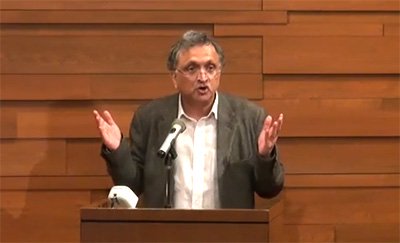Japan-India Dialogue 2014: Distinguished Visitors Program 2014
Between Nationalism and Internationalism: The Political Philosophy of Rabindranath Tagore
Rabindranath Tagore, the first Asian to win a Nobel Prize, is widely admired for his poetry, plays, and novels. But he was also a prescient political thinker, although this aspect of his legacy has not got the attention it deserves. This lecture will reconstruct Tagore's political philosophy by focusing on what he said and did in his travels through Japan, China, and the United States. He had a special affinity for Japan, a country he visited five times and whose cultural and aesthetic traditions he greatly admired. But he was worried about growing militarism in Japan, and spoke out against national and racial rivalries and hatreds. Tagore is important for his views, and for whom he influenced. As this lecture will show, his visionary internationalism had a profound impact on the ideas of Mahatma Gandhi, the acknowledged leader of the Indian freedom struggle, and on Jawaharlal Nehru, the first and longest serving Prime Minister of India.
Watch the video of the entire lecture given by Dr. Guha in Wochi Kochi Magazine
Outline
| Date | Wednesday, March 18, 2015, 6:30-8:00 pm |
|---|---|
| Venue | Iwasaki Koyata Memorial Hall, International House of Japan Access |
| Admission | Free (reservations required) |
| Language | English/Japanese (with simultaneous interpretation) |
| Co-organized by | The Japan Foundation and International House of Japan |
| How to apply | This event is fully booked. |
Profile
Ramachandra Guha

Dr. Ramachandra Guha is a historian and biographer based in Bangalore. He has taught at Yale and Stanford universities, held the Arné Naess Chair at the University of Oslo, and been the Indo-American Community Visiting Professor at the University of California at Berkeley. In 2011-2012 he served as the Philippe Roman Professor of History and International Affairs at the London School of Economics and Political Science.
His books include a pioneering environmental history, The Unquiet Woods (University of California Press, 1989), and an award-winning social history of cricket, A Corner of a Foreign Field (Picador, 2002). India after Gandhi (Macmillan/Ecco Press, 2007) was chosen as a book of the year by the Economist, Washington Post, Wall Street Journal, San Francisco Chronicle, Time Out, and Outlook, and as a book of the decade in The Times, Times of India, and The Hindu. His most recent book is Gandhi Before India (Knopf, 2014), which was chosen as a notable book of the year by the New York Times.
Apart from his books, Dr. Guha also writes a syndicated column that appears in six languages in newspapers with a combined readership of some twenty million. His books and essays have been translated into more than twenty languages. The New York Times has referred to him as “perhaps the best among India’s nonfiction writers”; Time Magazine has called him “Indian democracy’s pre-eminent chronicler.”
Dr. Guha’s awards include the Leopold-Hidy Prize of the American Society of Environmental History, the Daily Telegraph/Cricket Society Prize, the Malcolm Adideshiah Award for excellence in social science research, the Ramnath Goenka Prize for excellence in journalism, the Sahitya Akademi Award, and the R. K. Narayan Prize. In 2009, he was awarded the Padma Bhushan Award, the Republic of India’s third highest civilian honor. In 2008, and again in 2013, Prospect magazine nominated Dr. Guha as one of the world’s most influential intellectuals. In 2014, he was awarded an honorary doctorate in the humanities by Yale University.
[Contact Us]
The Japan Foundation
Asia and Oceania Section
Japanese Studies and Global Partnerships Programs Dept.
4-4-1 Yotsuya Shinjuku-ku Tokyo, 160-0004
TEL: +81-(0)3-5369-6070 FAX: +81-(0)3-5369-6041
- What We Do Top
- Arts and Cultural Exchange [Culture]
- Japanese-Language Education Overseas [Language]
- Japanese-Language Education Overseas [Language] Top
- Learn Japanese-language
- Teach Japanese-language
- Take Japanese-Language Test
- Know about Japanese-language education abroad
- The Japanese-Language Institute, Urawa
- The Japanese-Language Institute, Kansai
- Japanese-Language Programs for Foreign Specified Skilled Worker Candidates
- Japanese Language Education for Japanese Children Resident Overseas and for the Descendants of Migrants
- Archives
- Japanese Studies and Global Partnerships [Dialogue]
- JF digital collection
- Other Programs / Programs to Commemorate Exchange Year
- Awards and Prizes
- Publications

